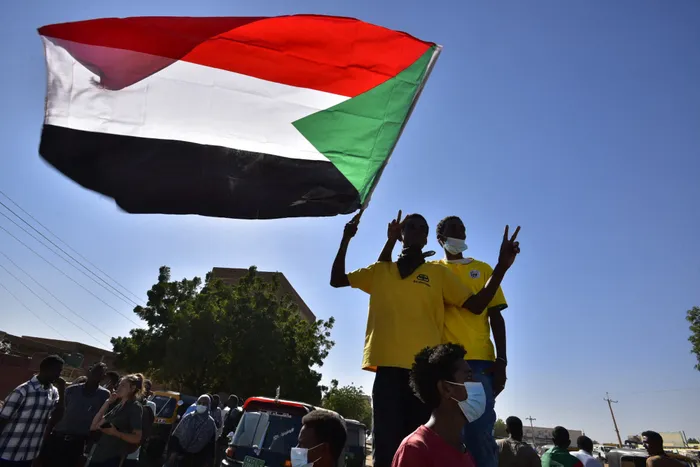Fair and violent-free elections in Sudan are possible, but it won’t come easily

Picture: AFP - Polls will be a crucial and important step to the success and credibility of political transition, not only in Sudan, but the region as a whole, which has been plagued by coups, rising inflation, and a growing insurgency, says the writer.
By Chad Williams
General elections in Sudan are scheduled to be held in 2023 as the country remains plagued beleaguered by political and socio-economic ills, with pro-democracy movements persisting in the fight for civilian rule in Sudan.
In June, the African Union said it would not be party to talks that exclude significant actors in an effort to get Sudan's transition back on track after last year's military coup.
Sudan's main civilian players have so far boycotted talks with military leaders, launched under international auspices earlier this month on reaching a political accommodation that would enable the restoration of desperately needed aid to the country.
According to media reports, denouncing “erroneous interpretations” of these statements, the AU representation in Khartoum clarified that they did not mean that the AU “withdraws from the troika” that it forms with the UN and the East African regional organisation Igad to supervise this dialogue, Africanews, wrote in June.
The transition process that followed Sudan’s 2019 revolution was designed to lead up to and be advanced by national elections.
In a blog post written by senior fellow for Africa policy studies at the Council on Foreign Relations, Michelle Gavin, which first appeared on the Council of Foreign Relations website in June, Gavin says that the June 30 demonstrations in Sudan reflect citizens' desire for civilian control of the state and the junta's discomfort with expressions of popular will. The international actors involved with Sudan should take note.
“The people of Sudan have other ideas. They have continued their protests despite lethal attempts to stop them, and resistance committees have called for commemorating this June 30 with massive countrywide demonstrations to continue demanding genuinely democratic, civilian-controlled government.”
Initial reports indicate that military authorities are responding with internet shutdowns and violence, the council reported in June, according to Gavin.
In 2021, Special Representative for Sudan, Volker Perthes, who is also the Head of the United Nations Integrated Transition Assistance Mission in Sudan (UNITAMS), told the United Nations Security Council that Sudan faced an insurmountable tower of challenges, which I will list below as per Perthes.
Main challenges that the people of Sudan face
Women and youth involvement. The swift formation of a diverse, inclusive and representative Legislative Council is critical to broaden the support for the political transition Sudanese youth also have expressed frustration over their lack of participation in transitional institutions.
On the economic front, Perthes said economic hardships, compounded by 304 percent inflation, large trade and fiscal deficits, high unemployment and poverty, are posing a risk to Sudan’s stability.
13.4 million people, one-quarter of the population, are projected to require humanitarian assistance, including 2.5 million internally displaced persons, he said.
Sudan hosts one million refugees, including 70,000 recent arrivals from Ethiopia.
The protection of civilians, especially as inter-communal clashes in El Geneina, West Darfur, in January left 165 people dead and over 100 000 displaced.
“Peace will only be sustainable if the root causes and ramifications of the conflicts are addressed,” he observed, said the Special Representative.
Tensions along the border with Ethiopia, and intermittent clashes between the two countries.
Essentially, polls will be a crucial and important step to the success and credibility of political transition, not only in Sudan, but the region as a whole, which has been plagued by coups, rising inflation, and a growing insurgency.
I tend to agree with the Kenya-based academic and research institute, the Rift Valley Institute, which so wonderfully analysed this crisis.
The institute said that the electoral process, and especially the results, may well be challenged by key stakeholders, while scepticism about the process will be encouraged by the long and problematic electoral history in Sudan.
This was the part that tickled me the most about the analysis, “history offers dramatic evidence of the different possibilities of elections by adult suffrage and secret ballot: potentially a way to create accountability and nurture popular participation, elections can also be tools of authoritarian rule.”
On 25 October 2021, the Sudanese military, led by General Abdel Fattah al-Burhan, took control of the government in a military coup. At least five senior government figures were initially detained.
The African Union representative recently suspended its participation in the tripartite mechanism to protest his exclusion from the direct meetings between the Forces for Freedom and Change (FFC) and the military component, media in Sudan reports.
The FFC National Coalition, which includes armed groups supporting the military coup, held a meeting with the African diplomats in Khartoum to explain its rejection of the direct meetings between the FFC and military leaders brokered by the Kingdom of Saudi Arabia (KSA) and the United States (US).
After the meeting, Minni Minnawi SLM leader and African Union Representative in Sudan, Mohamed Belaiche, spoke to the media to express their disapproval of the separate meetings.
Forthcoming elections could test the peace deal severely, as the International Crisis Group International points out.
It is safe to say that conflict will continue to plague South Sudan until its leaders forge a political system that distributes power more widely,
Sudan's military leadership could face isolation at home and abroad if it tries to tighten its grip after seizing power in the face of opposition from a sophisticated protest movement and from Western states that had invested in a democratic transition, African and international analysts agree.
Williams is a multi-media journalist.
This article is original to the The African. To republish, see terms and conditions.